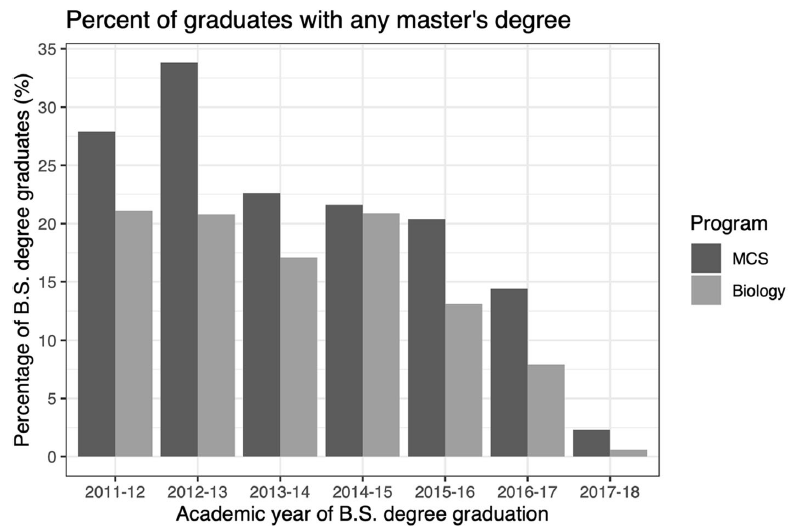Authors: Alexandria N. Ardissone, Jennifer C. Drew, and Eric W. Triplett
First author’s institution: University of Florida
Journal: Journal for STEM Education Research, 3, 403-412 (2020)
In the next month or so, the Class of 2021 will be the first to have graduated after experiencing a full academic year of emergency, online teaching. By now, we’ve all likely heard about learning losses during the pandemic. Yet, worries about the quality of online education are hardly new, with beliefs that online education is inferior in-person learning existing before the pandemic began.
Whether online learning is “inferior” to in-person learning though depends on how “inferior” is measured. For example, various studies (such at this one and this one) have found that students can learn just as well from online learning as they can from in-person learning, so online learning hardly appears to be “inferior.”
When it comes to longer-term outcomes however, that is an open question. It is possible that students with in-person educations might do better than students with an online education, students in online education might do better than students with in-person educations, or both groups might do the same. Today’s study which uses earning a graduate degree as a longer-term measure of success, supports the latter. The students in the study earned graduate degrees at similar rates, regardless whether they had attended an in-person or an online program.
For this study, the authors used the National Student Clearinghouse to collect outcome data for graduates of the Microbiology and Cell Science and Biology undergraduate programs at the University of Florida over an 8 year period, covering around 5,000 students. The degree programs are similar but in 2011, the Microbiology and Cell Science program converted all of its upper division courses (think 3rd and 4th year courses) to online while the biology program maintained its courses in an in-person form. Because the students in the Microbiology and Cell Science program still had other courses, they were still “in-person” at the university but took their Microbiology and Cell Science courses online.
The researchers then compared the fraction of students graduating from each program who later earned any type of graduate degree, such as a master’s degree, a PhD, an MD, and any other doctoral medical degree (e.g. PharmD, D.O., D.V.M). Due to the limited number of degrees earned during some years and the fact that not all graduates would have had time to earn a degree (e.g. it would be nearly impossible for someone graduating in 2018 to have a PhD by now), the researchers aggregated the number of degrees across all years.
Despite worries that graduates of the online program might fare worse, that’s not what the researchers found. Instead, 30% of graduates of either program earned a graduate degree. Similarly, the fraction of graduates who earned any doctoral degree was similar between the programs. (Figure 1)

As many of the students in the programs were interested in entering the medical field, the researchers were also interested in whether there were differences in the fraction of graduates who earned those degrees. Yet, the researchers didn’t find any differences there either.
There was one type of degree where the researchers did notice a statistically significant difference however, master’s degrees. 17% of graduates from the Microbiology and Cell Science earned a master’s degree compared to 12% of the Biology graduates. (Figure 2)

As master’s degrees are often given as compensation for those who aren’t able to meet the requirements to continue in science PhD programs, this result could serve as evidence that the online program did have worse outcome. If this were the case however and graduates of the online program were less prepared, the researchers would have expected to see differences in the fraction of graduates earning medically-focused master’s degrees.
Yet, this wasn’t the case. Graduates of both programs earned medically-focused master’s degrees at similar rates, suggesting that the difference in overall master’s degree wasn’t due to an inability to complete a PhD.
What can we learn from this study?
Despite worries that online learning might lead to worse outcomes for students down the line, this study didn’t find evidence for that claim. Instead, students from an online degree program earned graduate degrees at similar rates as students who graduated from a more typical in-person program.
As always, there are a few caveats to the conclusion. First, this study only reflects the results of one university with similar, but not the same programs and was not a randomized study.
Second, converting the Microbiology and Cell Science program to online was done thoughtfully and intentionally and not in an emergency fashion. Therefore, the results may not necessarily be applicable to what is happening now.
Nevertheless, today’s study suggests that when done properly, online degrees can prepare students for graduate work just as well as traditional in-person classes.
Figures used under CC BY 4.0. Image by Gillian Callison from Pixabay.
I am a postdoc in education data science at the University of Michigan and the founder of PERbites. I’m interested in applying data science techniques to analyze educational datasets and improve higher education for all students

